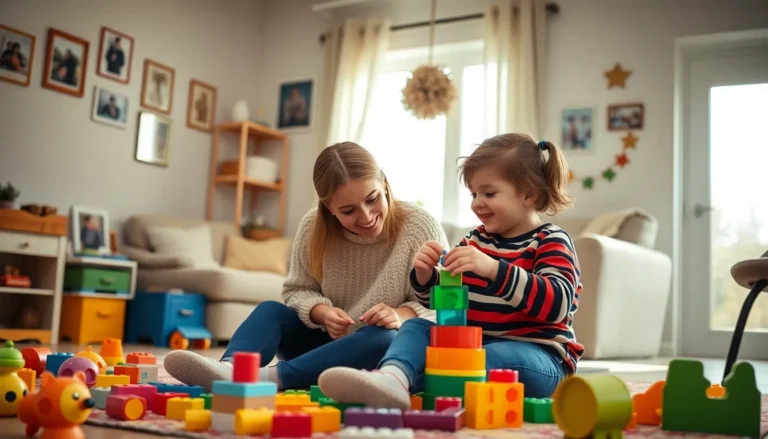Table of Contents
ToggleNavigating the world of co-parenting after a divorce in Arizona can feel like trying to ride a unicycle on a tightrope—challenging but not impossible. With the sun shining brightly over the Grand Canyon State, it’s vital for parents to find a balance that keeps their kids happy while maintaining their sanity. After all, nobody wants to turn family outings into a scene from a reality show!
Understanding Co-Parenting After Divorce In Arizona
Co-parenting after a divorce in Arizona presents unique challenges that require effective communication and cooperation. Maintaining a respectful relationship between parents ensures that children adapt better to their new circumstances. Establishing clear guidelines can prevent misunderstandings and conflicts.
Educating oneself about Arizona’s family laws can significantly benefit co-parents. Knowledge of custody arrangements, parenting time, and child support obligations helps set realistic expectations. Arizona law encourages parents to create a parenting plan focusing on the child’s best interests.
Utilizing resources such as mediation services can facilitate smoother negotiations. Professionals can assist parents in resolving disputes and crafting amicable agreements. Engaging in shared parenting activities fosters collaboration, allowing parents to discuss their children’s needs constructively.
Respecting each parent’s role and maintaining consistent rules can strengthen co-parenting outcomes. Compatibility in parenting styles contributes to a stable environment conducive to children’s development. Observing the children’s emotional health serves as a guiding factor in these situations.
Navigating holidays and special events collaboratively minimizes tension. Planning in advance promotes a shared responsibility, allowing both parents to participate in significant occasions. Finding time for family outings encourages positive interactions, reducing the potential for chaos.
Incorporating feedback from children within discussions promotes their sense of security. Listening to their needs leads to more effective parenting decisions. Creating a harmonious co-parenting experience ultimately benefits everyone involved, ensuring children’s emotional and physical well-being.
Legal Framework For Co-Parenting In Arizona

Arizona’s co-parenting laws focus on children’s best interests. Understanding these laws helps parents navigate custody and support arrangements effectively.
Child Custody Laws
Arizona follows a joint custody approach, emphasizing shared parenting roles. Courts typically favor arrangements that allow both parents to remain actively involved in their children’s lives. Factors such as each parent’s ability to provide a stable environment and their relationship with the child influence custody decisions. Parents may agree on legal or physical custody plans, outlining specific responsibilities. Additionally, Arizona emphasizes the importance of children maintaining relationships with both parents, fostering emotional stability and overall well-being.
Visitation Rights
Visitation rights in Arizona are determined alongside custody agreements. Courts usually grant reasonable visitation to non-custodial parents, ensuring children maintain strong ties with both sides of the family. Specific visitation schedules can be arranged, accommodating parents’ work commitments and children’s activities. Flexibility is encouraged to adjust plans as needed, reflecting the evolving needs of children. It’s essential for parents to adhere to the established visitation schedule, promoting a sense of security for their children amidst changes.
Effective Co-Parenting Strategies
Co-parenting after divorce in Arizona presents unique challenges. Implementing effective strategies promotes a healthier environment for children.
Communication Tips
Maintain open lines of communication for effective co-parenting. Use clear language to express thoughts and feelings without ambiguity. Regular check-ins via calls or messages help keep both parents informed about children’s needs. Focus on discussing children’s schedules, activities, and any changes to plans. Avoid discussing personal grievances or issues unrelated to parenting; it strains the co-parenting relationship. Respectful communication promotes a sense of stability for children. Encouragement of children’s expressions ensures they feel heard and valued. Listening actively to each other builds a cooperative atmosphere.
Setting Boundaries
Establishing firm boundaries is critical for effective co-parenting in Arizona. Set clear guidelines regarding parenting roles and responsibilities to prevent misunderstandings. Discuss expectations surrounding communication frequency, decision-making, and parenting time. Keeping boundaries consistent reduces conflict and promotes cooperation. Addressing issues promptly prevents escalation and maintains a positive co-parenting environment. Each parent can define personal space and time for individual activities outside of co-parenting. Flexibility remains essential, especially when unexpected situations arise. By respecting these boundaries, both parents contribute to a more harmonious co-parenting experience for their children.
Common Challenges And Solutions
Co-parenting after divorce in Arizona presents unique challenges. Addressing these obstacles ensures stability for children.
Emotional Struggles
Transitions induce emotional struggles for both parents and children. Feelings of anger, sadness, and confusion often surface post-divorce. Acknowledging these emotions fosters a healthier atmosphere. Support from counselors or therapists aids emotional healing. Open discussions about feelings allow parents to validate children’s experiences. Listening actively enhances connection, promoting mutual understanding. Regular family meetings can create a safe space for emotional expression. Ultimately, prioritizing emotional well-being strengthens the family unit.
Co-Parenting Conflicts
Co-parenting conflicts frequently arise due to miscommunication or differing parenting styles. Regular communication minimizes misunderstandings that exacerbate tensions. Setting clear expectations regarding parenting responsibilities reduces friction. Utilizing tools like shared calendars helps coordinate schedules effectively. When disputes occur, staying focused on children’s needs can redirect conversations. Mediation services provide neutral ground for resolving conflicts amicably. Engaging in collaborative decision-making encourages teamwork and shared goals. Addressing issues promptly prevents resentments from building and maintains focus on what’s best for the children.
Resources For Co-Parents In Arizona
Several resources are available in Arizona to support co-parents navigating post-divorce challenges. These resources provide essential assistance for maintaining healthy co-parenting relationships and ensuring children’s well-being.
Support Groups
Support groups offer co-parents a community for shared experiences and encouragement. Organizations like the Arizona Co-Parenting Support Network provide sessions for individuals to connect, share challenges, and learn strategies from others in similar situations. Attendance at these groups fosters a sense of belonging, which helps in managing emotional difficulties. Participants can access resources related to co-parenting techniques and child development. Online platforms also host virtual support group options, making attendance flexible and convenient.
Legal Assistance
Legal assistance plays a crucial role in understanding co-parenting rights and obligations. Lawyers specializing in family law can clarify custody agreements, visitation rights, and child support arrangements in Arizona. The Arizona Bar Association offers a lawyer referral service, helping individuals find qualified attorneys. Additionally, legal informational websites provide self-help resources on navigating family law issues. When co-parents seek assistance, they gain clarity on legal matters, enabling better decision-making for their children’s future. Access to mediation services further facilitates amicable resolutions, reducing conflict between parties.
Navigating co-parenting after divorce in Arizona can be challenging yet rewarding. By prioritizing effective communication and mutual respect parents can create a stable environment for their children. Utilizing available resources such as support groups and mediation services enhances the co-parenting experience.
Establishing clear guidelines and maintaining flexibility in arrangements fosters cooperation and minimizes conflicts. Ultimately the focus should remain on the children’s well-being ensuring they feel secure and supported throughout the transition. With dedication and teamwork parents can successfully navigate this journey together.




